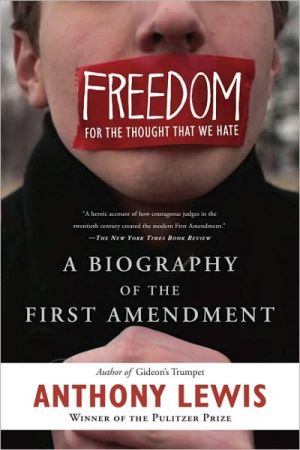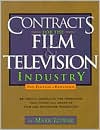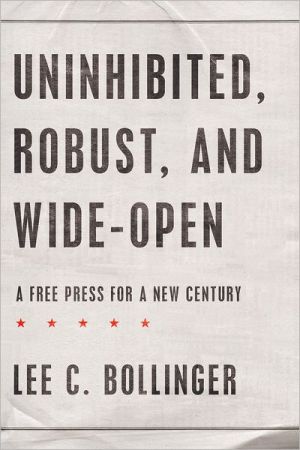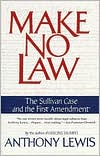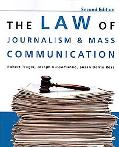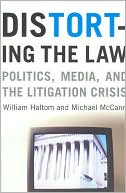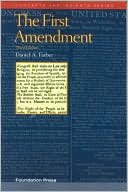Freedom for the Thought That We Hate: A Biography of the First Amendment
More than any other people on earth, we Americans are free to say and write what we think. The press can air the secrets of government, the corporate boardroom, or the bedroom with little fear of punishment or penalty. This extraordinary freedom results not from America’s culture of tolerance, but from fourteen words in the constitution: the free expression clauses of the First Amendment.\ In Freedom for the Thought That We Hate, two-time Pulitzer Prize-winner Anthony Lewis describes how our...
Search in google:
From one of the country’s most esteemed experts on the First Amendment and the author of the classic Gideon’s Trumpet, an eloquent essay on the importance of freedom of expression The Barnes & Noble Review You might figure that decades spent examining government would turn a fellow into a dejected cynic. Thus, it is heartening that Anthony Lewis, the longtime New York Times Op-Ed page columnist and veteran Supreme Court observer, still feels so much reverence for the federal government's judicial branch. Indeed, his reverence is not just heartening, it's infectious. At a time when the judiciary comes under frequent attack, his Freedom for the Thought That We Hate makes a compelling case that our much-maligned judges deserve credit for "many of the great advances in the quality -- and decency -- of American society."
Introduction ix1 Beginnings 12 "Odious or Contemptible" 113 "As All Life Is an Experiment" 234 Defining Freedom 395 Freedom and Privacy 596 A Press Privilege? 817 Fear Itself 1018 "Another's Lyric" 1319 "Vagabonds and Outlaws" 14310 Thoughts That We Hate 15711 Balancing Interests 16912 Freedom of Thought 183Acknowledgments 191Table of Cases 193Notes 197Index 209
\ Jeffrey RosenIn the 21st century, the heroic First Amendment tradition may seem like a noble vision from a distant era, in which heroes and villains were easier to identify. But that doesn't diminish the inspiring achievements of First Amendment heroism. Conservative as well as liberal judges now agree that even speech we hate must be protected, and that is one of the glories of the American constitutional tradition. Anthony Lewis is right to celebrate it.\ —The New York Times\ \ \ \ \ Publishers WeeklyThe First Amendment's injunction that "Congress shall make no law... abridging the freedom of speech, or of the press" seems cut and dried, but its application has had a vexed history, according to this lucid legal history, Lewis's first book in 15 years (after Make No Law and Gideon's Trumpet). Some suppressions of free speech passed constitutional muster in their day: the 1798 Sedition Act criminalized criticism of the president, and the WWI-era Sedition Act sentenced a minister to 15 years in prison for telling his Bible class that "a Christian can take no part in the war." Law professor and Pulitzer Prize-winning ex-New York Times columnist Lewis explores other First Amendment legal quagmires, including libel law, privacy issues, the press's shielding of confidential sources, obscenity and hate speech. Not quite a free speech absolutist, he's for punishing "speech that urges terrorist violence to an audience... whose members are ready to act." Lewis's story is about the advancement of freedom by the likes of Oliver Wendell Holmes Jr., Louis Brandeis and others whose "bold judicial decisions have made the country what it is." The result is an occasionally stirring account of America's evolving idea of liberty. (Jan. 14)\ Copyright 2007 Reed Business Information\ \ \ School Library JournalThe First Amendment's injunction that "Congress shall make no law... abridging the freedom of speech, or of the press" seems cut and dried, but its application has had a vexed history, according to this lucid legal history, Lewis's first book in 15 years (after Make No Law and Gideon's Trumpet). Some suppressions of free speech passed constitutional muster in their day: the 1798 Sedition Act criminalized criticism of the president, and the WWI-era Sedition Act sentenced a minister to 15 years in prison for telling his Bible class that "a Christian can take no part in the war." Law professor and Pulitzer Prize-winning ex-New York Times columnist Lewis explores other First Amendment legal quagmires, including libel law, privacy issues, the press's shielding of confidential sources, obscenity and hate speech. Not quite a free speech absolutist, he's for punishing "speech that urges terrorist violence to an audience... whose members are ready to act." Lewis's story is about the advancement of freedom by the likes of Oliver Wendell Holmes Jr., Louis Brandeis and others whose "bold judicial decisions have made the country what it is." The result is an occasionally stirring account of America's evolving idea of liberty. (Jan. 14)\ Copyright 2007 Reed Business Information\ \ \ \ \ Kirkus ReviewsA superb history of the First Amendment and the body of law that has followed it. Pulitzer Prize-winning journalist and longtime Supreme Court observer Lewis (Make No Law: The Sullivan Case and the First Amendment, 1991, etc.), now retired from the New York Times, explains in the clearest of language how freedom of expression evolved in this country. Surprisingly, it was only in 1919 that a Supreme Court justice (Oliver Wendell Holmes) wrote that the First Amendment protected speech and publication, and that was in a dissent-not until 1931 did a majority on the Court begin enforcing the constitutional guarantee of freedom of speech. Drawing examples from many cases, Lewis demonstrates that interpretations of the First Amendment shifted over time as the Supreme Court, and the public, began to recognize that freedom of expression was one of America's basic values. He considers the ways in which freedom can conflict with such other values as the right to privacy, protection from hate speech, the safeguarding of national security and the right to a fair trial (i.e., one uncompromised by prejudicial press coverage). He also explores the evolution of laws against libel here and in Great Britain and reports on the impact of the landmark 1964 case, New York Times v. Sullivan, which ended the press's fear of seditious libel actions and promoted the investigative spirit that led to critical coverage of the Vietnam War and Watergate. Anecdotes abound in this lively, lucid history. Among other choice bits, readers will learn which Supreme Court Justice viewing films for their possibly pornographic content took a law clerk with him to tell him what was happening on the big screen. Timely andimportant, a work that astonishes and delights as it informs.\ \ \ \ \ The Barnes & Noble ReviewYou might figure that decades spent examining government would turn a fellow into a dejected cynic. Thus, it is heartening that Anthony Lewis, the longtime New York Times Op-Ed page columnist and veteran Supreme Court observer, still feels so much reverence for the federal government's judicial branch. Indeed, his reverence is not just heartening, it's infectious. At a time when the judiciary comes under frequent attack, his Freedom for the Thought That We Hate makes a compelling case that our much-maligned judges deserve credit for "many of the great advances in the quality -- and decency -- of American society." \ This short and lucid volume -- which arrives more than 40 years after the author's classic Gideon's Trumpet, a history of Gideon v. Wainwright, the landmark case that established a criminal defendant's right to counsel -- has a simple question at its heart: where does the extraordinary freedom of thought and expression found in the United States come from? We all know that the First Amendment asserts that "Congress shall make no law...abridging the freedom of speech, or of the press." But as Lewis shows, those words are not the end of the story but its beginning. Our understanding of these freedoms has evolved, and Lewis gives the Supreme Court pride of place in facilitating that evolution.\ For proof that the process got off to a slow start, however, look no further than 1798's Sedition Act, which criminalized "any false, scandalous and malicious writing or writings against the government of the United States." Proponents argued that in the wake of the French Revolution, the legislation was necessary to prevent French terrorism on U.S. shores. (Exploiting fear of terrorism in order to erode civil liberties? Shocking!) During its brief life (it was never tested in the Court), 14 men were prosecuted under the Act; all were eventually pardoned by Thomas Jefferson when he became president.\ Not until the 20th century did the Court begin to take up issues of freedom of speech and the press. During the 1920s, a series of dissenting opinions by Justices Oliver Wendell Holmes Jr. and Louis D. Brandeis sparked what Lewis calls "a legal revolution." They "had only two votes of nine," he writes. "But their rhetoric was so powerful, so convincing, that it changed the attitude of the country and the Court." In a measure of how far we've come, the cases Lewis summarizes are difficult to imagine today. In one, the Supreme Court upheld prison sentences of a whopping 15 and 20 years for four radicals convicted under 1918's Espionage Act. Their offense? Distributing leaflets urging a general strike to protest Woodrow Wilson's decision to send U.S. troops to Russia following the Bolshevik Revolution.\ It was in his dissent in a 1929 case, United States v. Schwimmer, that Holmes, then 88 years old, coined the phrase that provides Lewis his title. Rosika Schwimmer was a Hungarian immigrant seeking U.S. citizenship, but she was also a pacifist, and as such refused to swear that she would take up arms to defend the nation, a requirement of citizenship at the time. As, ahem, a woman of a certain age, Schwimmer wouldn't be taking up arms anytime soon, but citizenship was still denied her, and the Supreme Court upheld the denial. Holmes's minority opinion argued, "If there is any principle of the Constitution that more imperatively calls for attachment than any other it is the principle of free thought -- not free thought for those who agree with us but freedom for the thought that we hate."\ By the next decade, a majority on the Court had begun upholding the Constitution's free-speech guarantee, relying on Holmes's and Brandeis's arguments. "Giving concrete meaning to [the First Amendment] was a daunting, and endless, job," Lewis writes. The remainder of the book describes the landmark cases that have both expanded the freedoms of speech and of the press and weighed them in comparison to other values, such as the right to privacy, the protection from hate speech, and the maintaining of national security.\ One of the most fascinating (and the topic of an earlier book by Lewis) is 1964's New York Times v. Sullivan, in which the Court overturned a successful libel claim from one L. B. Sullivan. Sullivan was a city commissioner in Alabama who had sued the Times after the newspaper published a procivil rights advertisement referring to unnamed "Southern violators of the Constitution." The lower-court ruling, which awarded Sullivan a then-record $500,000 in damages, threatened to discourage the press from covering the civil rights movement. The Supreme Court's reversal was the first to make libel a free-speech issue, and Lewis argues that it emboldened the press, now unencumbered by the specter of libel suits, to delve into civil rights, then Vietnam and Watergate, with portentous results.\ Lewis is no free-speech absolutist: he notes that the downside of Sullivan is that "you can say practically anything about a public person without fear of having to pay damages." He also rues the diminution of the right to privacy, citing the recent and shameful case of scientist Wen Ho Lee, wrongfully accused of being a spy, as an example. But the author is less troubled by an excess of freedom than by those instances when our First Amendment rights have been curtailed. "It is a seeming characteristic of American society that it is periodically gripped by fear -- fear manipulated by politicians," he notes. The Court has not always responded. There were those French terrorists of 1798, but also two American red scares, the WWII-era internment of Japanese Americans, and of course today's war on terror (although its greatest civil liberties offenses, like torture, don't fall under the First Amendment's purview). As a former newspaperman, Lewis has harsh words for today's press, calling it a "stenographer for official views" since 9/11.\ So much of interest is packed into this slim volume. But Lewis's most trenchant analysis goes back to his opening question. Why is the United States different? He charts the changing interpretation of our laws, yes, but he also makes a case for American difference in a way that avoids lapsing into exceptionalism. In 11 European countries, Holocaust denial is a criminal act, but unlike Europe, the United States hasn't had to face atrocities on the level of the Holocaust. In reference to a Rwandan law that, following the massacre of Tutsis there, prohibits public statements that promote "divisionism," Lewis asks, "Should we in America who have avoided such tragedies tell Rwandans that it is wrong for them thus to limit freedom of speech?" Given the troubled age we live in, these issues are likely to get thornier, making Lewis's eloquent description of the First Amendment particularly apt: "[I]t has been a drama since 1791, and it still is today: a tale without end." --Barbara Spindel\ Barbara Spindel has covered books for Time Out New York, Newsweek.com, Details, and Spin. She holds a Ph.D. in American Studies.\ \ \
